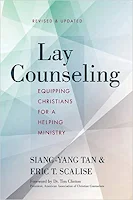Lay Counseling is a handbook for paraprofessional services. Although the focus is on Christian counseling, the book is important for all clinicians. In this post I review some key features of the book.
Lay Counseling is the kind of book that anyone who works in the field of mental health should consider because it provides current information about the counselors, programs, and services that are part of a support network beyond the world of licensed providers. The book offers an explicitly Christian approach to mental health services. The reason it should be read by those outside the Christian community is because Christianity is the world's largest religion and many Christians who seek counseling wish to see a Christian provider. Since many providers are not licensed mental health providers, it is important to understand who is doing what when it comes to this large informal network of paraprofessionals.
_______________________________________________
LAY COUNSELING: EQUIPPING CHRISTIANS FOR A HELPING MINISTRY: REVISED & UPDATED.
Tan, S. & Scalise, E.T. (2016). Lay counseling: equipping Christians for a helping ministry: Revised & updated. Zondervan.
Pp. 318., ISBN 9780310524274
Reviewed by Geoffrey W. Sutton, Evangel University, Springfield, MO.
_______________________________________________
I got my copy of Lay Counseling from Siang-Yang Tan who stopped by a presentation my colleagues and I presented documenting client factors that predict outcomes amongs those who attenkded Christian Counseling. A number of the clients reported seeing clergy. Following our discussion, Tan told me of his updated text. Later in the day he gave me a copy (disclosure), which I have reviewed for an academic journal.
The book consists of 12 chapters. You will find a brief description of the lay counseling movement --mostly in the United States--along with a summary of the limited research into Christian lay counseling. There isn't a lot of research so the field is wide open--a good topic I suggest for graduate students in counseling and psychology programs.
After the "backstory," the authors provide considerable details that will help Christian leaders establish a Christian lay counseling program in their churches or community. The details include guidelines on counselor selection, training programs, supervision, ethical and legal considerations, forms, and even types of offices and financial considerations. It really is a "how to" guidebook.
What we learn is that there are several approaches to Christian lay counseling. The authors present a model that is founded in Christian ministry and eclectic in drawing on the work of Christian clinicians from the past several decades. However, the authors, both psychologists, draw upon principles and techniques of change found in such other recognizable leaders as Aaron Beck and Arnold Lazarus.
I posted my academic review on ResearchGate and Academia .
It has been accepted for publication in the Journal of Psychology and Christianity.
It has been accepted for publication in the Journal of Psychology and Christianity.
Disclosure: The only thing I received for this review is the free book.
Connect
My website: www.suttong.com [ https://sites.google.com/view/suttong/home ]
My Books on AMAZON


Comments
Post a Comment